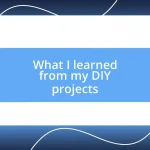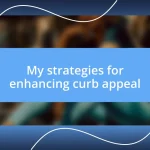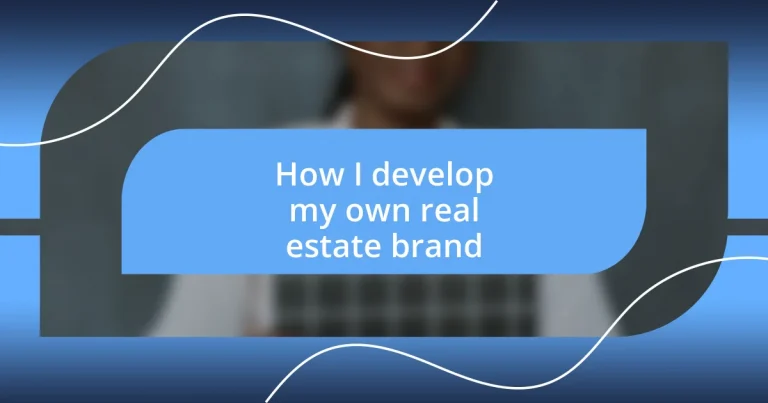Key takeaways:
- Authenticity and personal storytelling are vital in defining a real estate brand and connecting with clients.
- Identifying and understanding your target audience’s behaviors and preferences enhances marketing strategies and builds stronger client relationships.
- Building a professional brand identity through consistency in visuals and messaging, along with networking, fosters trust and credibility in the real estate market.
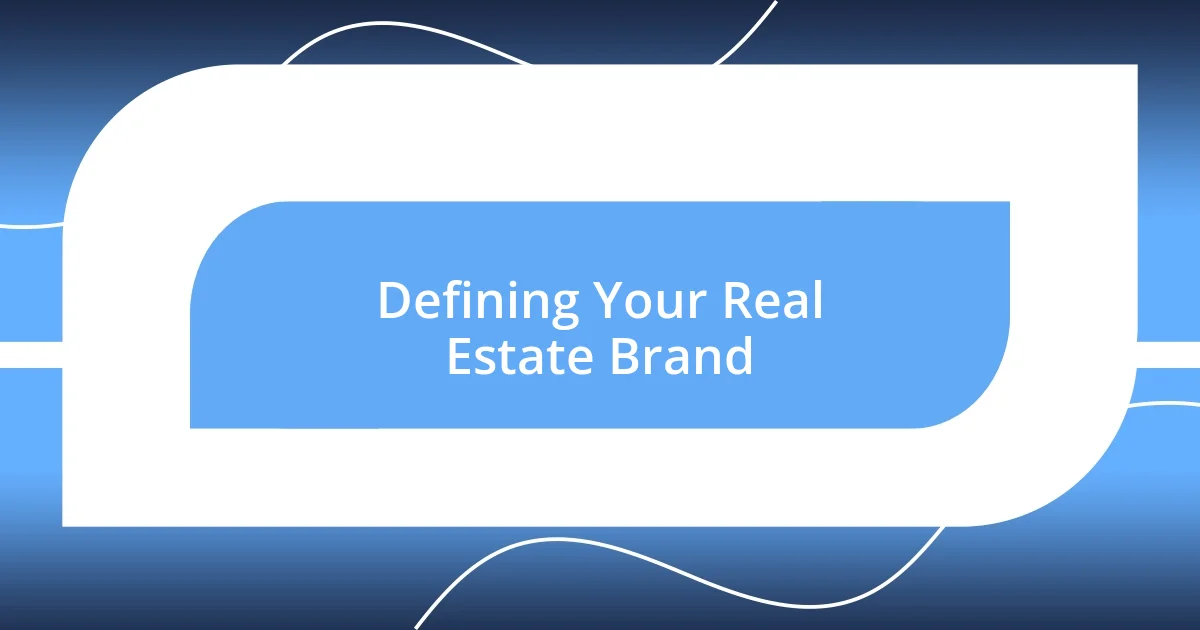
Defining Your Real Estate Brand
Defining your real estate brand is akin to finding your unique voice in a crowded marketplace. When I first started, I realized that listing properties wasn’t enough; I needed to convey who I was and what I valued. What do you want your clients to feel when they think of you? Understanding the answer to this question is crucial.
One unforgettable experience taught me the importance of authenticity in branding. I had a client who was captivated by my personal story of moving into an old home and restoring it. This connection helped me to stand out, as they perceived me not just as an agent but as someone who shared their passion for real estate. Have you considered how your experiences can shape your brand identity?
Creating a brand also involves recognizing your target audience’s needs and desires. I often ask myself what my ideal clients are looking for beyond just a property. By focusing on their emotions—whether it’s the excitement of buying their first home or the stress of downsizing—I ensure my brand resonates deeply. How do your personal insights align with the aspirations of your clients?
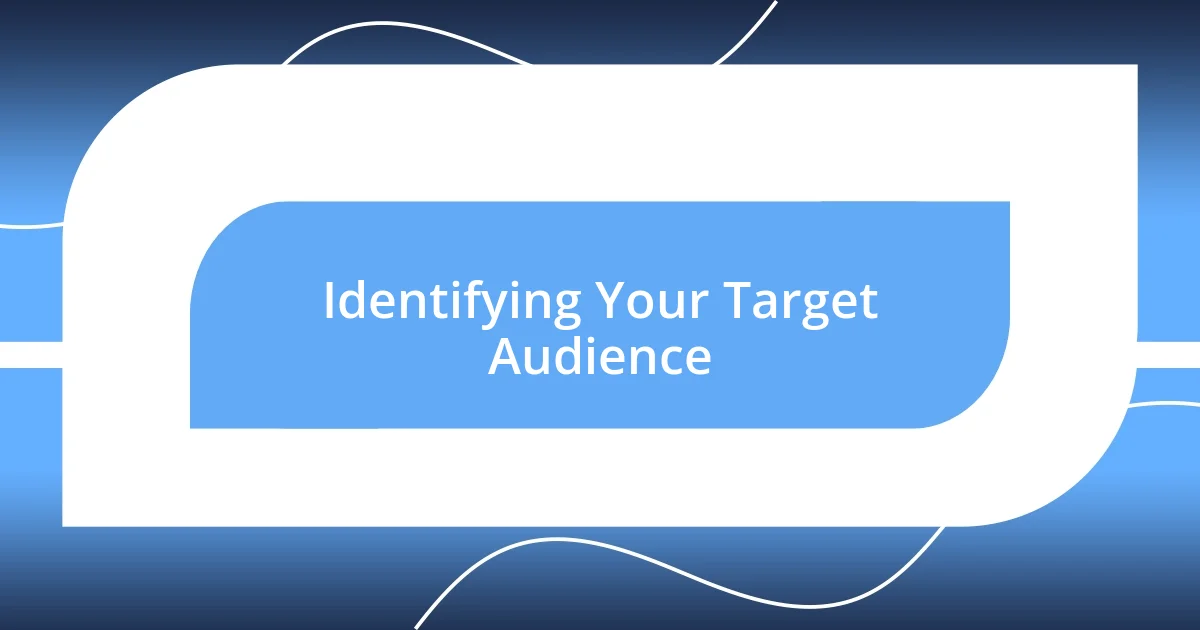
Identifying Your Target Audience
Identifying your target audience is a crucial step in building a successful real estate brand. When I first delved into real estate, I didn’t realize how important it was to define who I was marketing to. My initial approach was broad, but focusing on specific demographics helped me to craft messages that truly resonate. Have you taken the time to think about who your ideal clients are?
Through my journey, I’ve found that understanding your audience goes beyond demographics; it’s about digging into their behaviors and preferences. I recall a memorable conversation with a young couple looking for their first home. They didn’t just want a house; they wanted a community where they felt connected. Grasping these subtleties changed how I approached my marketing strategies. Isn’t it fascinating how these insights can inform your branding?
To effectively identify your target audience, consider creating personas based on your research. I’ve built detailed profiles that include interests, life stages, and investment goals of potential buyers. This practice has transformed my marketing campaigns, making them more targeted and effective. How can you shape your branding approach by understanding these personas?
| Audience Characteristics | Examples |
|---|---|
| Demographics | Age, gender, income level |
| Psychographics | Values, interests, lifestyles |
| Buying Behavior | First-time buyers, investors, downsizers |
| Needs and Pain Points | Desire for community, affordability, space for family |
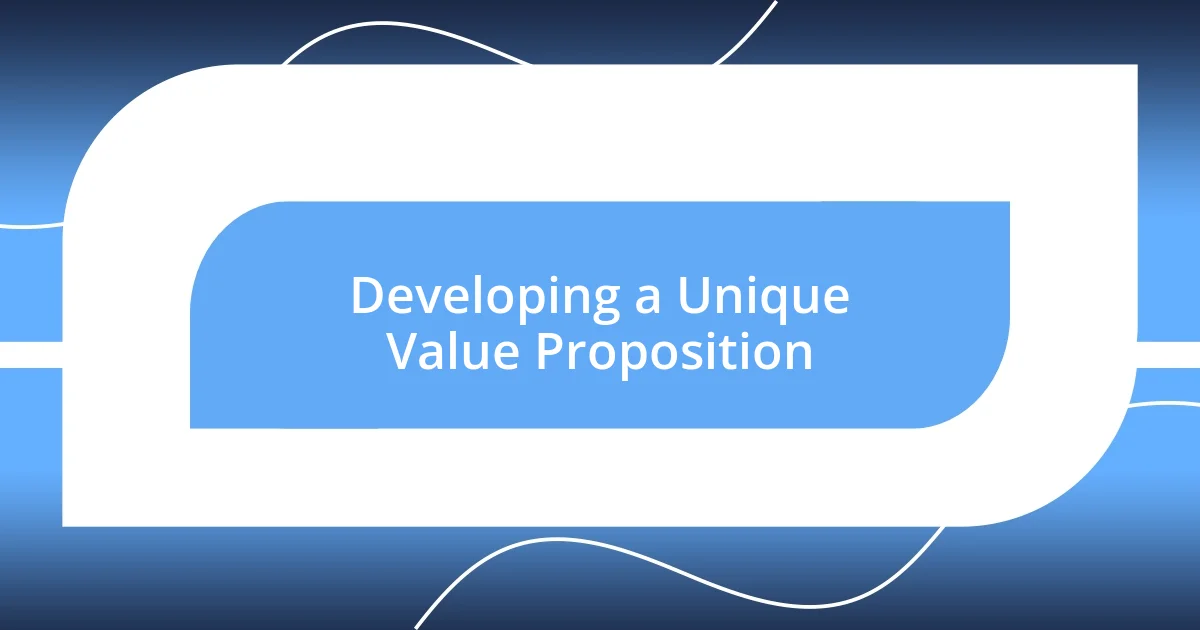
Developing a Unique Value Proposition
Developing a unique value proposition is what truly sets you apart in real estate. I remember when I first refined my own proposition; it was like turning on a light in a dark room. I realized that by incorporating my deep knowledge of local neighborhoods, combined with a genuine passion for helping families find their forever homes, I could speak directly to what my clients needed. It’s essential to articulate why you are the best choice for them.
- Highlight your unique skills—perhaps you’re a local market expert or have a knack for staging homes beautifully.
- Emphasize your personal approach—clients often appreciate an agent who listens and values their input.
- Share your passion for real estate—people connect with enthusiasm and authenticity, making your offer more appealing.
Crafting this value proposition involves introspection as much as it does market research. There was a time I sat down with a mentor of mine, who challenged me to distill what I was truly passionate about in real estate. Through this process, I discovered that my love for community events and local culture drew clients toward me. That first experience of creating connections and showcasing my commitment to the community felt exhilarating and shaped the way I present my brand today.
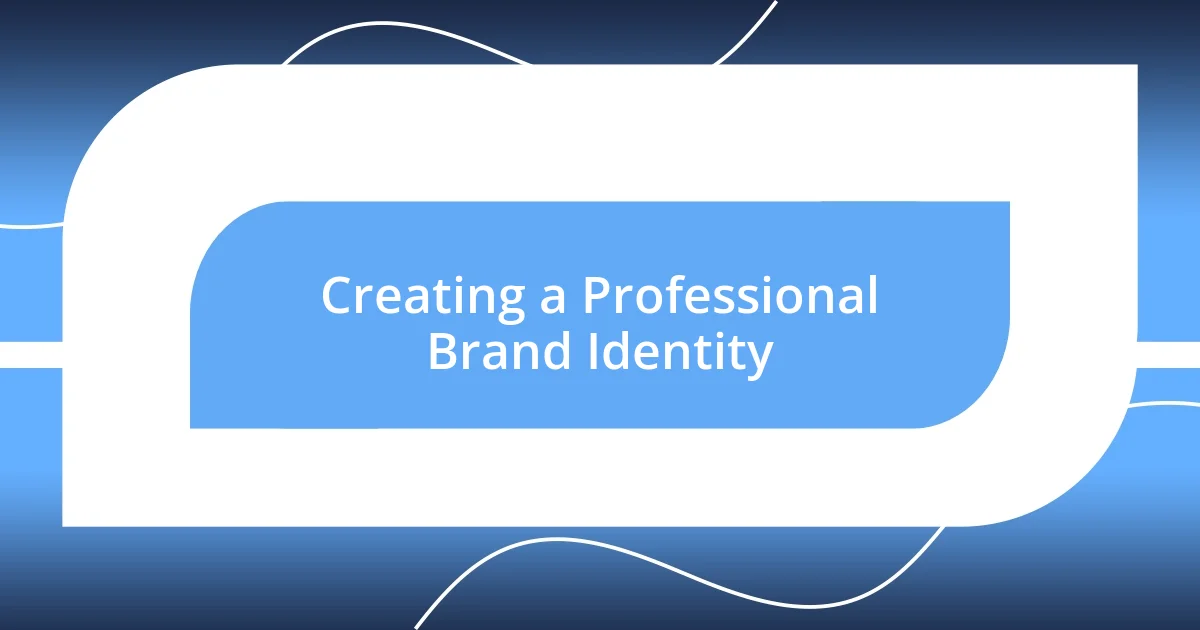
Creating a Professional Brand Identity
Creating a professional brand identity is essential in establishing credibility in the real estate market. I vividly recall the moment I designed my first business card—everything down to the color scheme spoke to who I was. The choice of a modern, clean design reflected my commitment to professionalism, while a little splash of personality in the logo hinted at my approachable nature. Have you thought about how your visual elements might convey your brand’s essence?
Beyond visuals, I’ve come to understand that consistency in messaging is equally important. When I began posting on social media, I made a conscious effort to ensure my tone and content aligned with my brand values. One day, after sharing a heartfelt story about a family’s journey to their new home, I received a flurry of messages from people who felt connected to my vision. It made me realize that authenticity resonates far deeper than any marketing tactic ever could. Isn’t it interesting how sharing personal stories can elevate your brand identity?
I also learned that engaging with your community plays a pivotal role in building your brand. Early on, I volunteered for local housing initiatives, which not only enriched my experience but also helped me foster relationships. This proactive approach showed my commitment to the area and made my brand more relatable. Reflecting on those moments, I’ve often asked myself: how can my involvement in the community further solidify my brand identity? I believe that when you genuinely invest in the places you serve, your brand transforms from just a name into a trusted local presence.
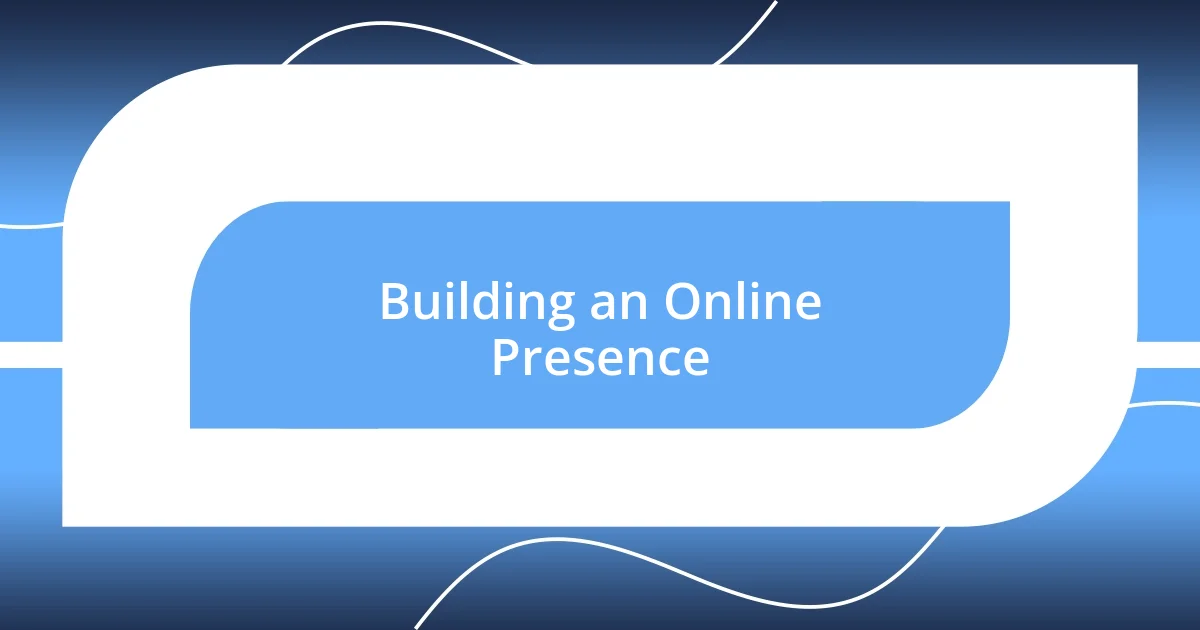
Building an Online Presence
Building an online presence is crucial in today’s digital-first world, especially in real estate. I remember when I first dipped my toes into social media; it felt overwhelming at first. However, I quickly realized that platforms like Instagram and Facebook are not just for showcasing listings, but for sharing my journey and connecting with clients on a personal level. Have you thought about how to use social media to tell your story?
In my early days, I started a simple blog where I shared home buying tips and highlighted local businesses. It was more than just content; it became my way of building relationships with the community. I recall one particular blog post, where I interviewed a local artisan who crafted unique furniture. Seeing his craftsmanship and hearing his story not only enriched my content but also brought in inquiries from clients interested in supporting local talent. Doesn’t it feel rewarding when your passion projects spark newfound interest?
Moreover, I found that engaging with followers through regular posts and responsive comments nurtures trust. When prospects ask questions, I make it a point to respond promptly and thoughtfully. Once, a follower asked about the best family-friendly neighborhoods, and my detailed reply led to an engaging conversation that turned into a client relationship. This taught me the value of creating genuine connections that can flourish online. How often do you take the time to really interact with your audience?
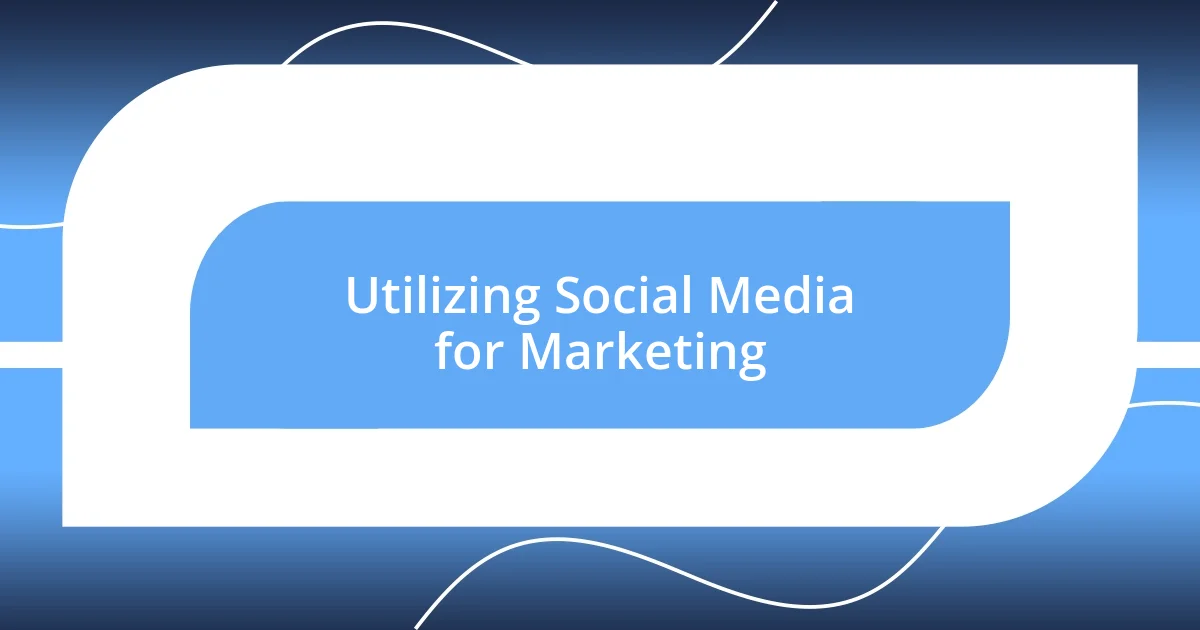
Utilizing Social Media for Marketing
Utilizing social media for marketing has become one of my most effective tools in developing my real estate brand. I remember the excitement when I first decided to host a virtual open house on Facebook Live. Not only did it give potential buyers a real-time tour, but the immediate feedback in the comments section made it feel like we were all part of a conversation. Have you explored new formats like live events to engage your audience?
Once, I decided to create a weekly Q&A series on my Instagram Stories, which transformed the way I connected with my clients. Initially, I was nervous about putting myself out there, but as I answered questions about the home buying process, I noticed an increase in direct messages from interested clients. It was fascinating to see how my willingness to share knowledge turned into trust. How do you think your expertise can help foster similar connections online?
I’ve also found that showcasing testimonials on social media can be a game-changer. One of my clients sent me a heartfelt video after we finalized her family’s new home purchase. I shared that video on my platforms, and the emotional impact it had was palpable. People love authentic stories; they create a relatable bridge. Isn’t it powerful how a real-life experience can resonate and attract potential clients to your brand?
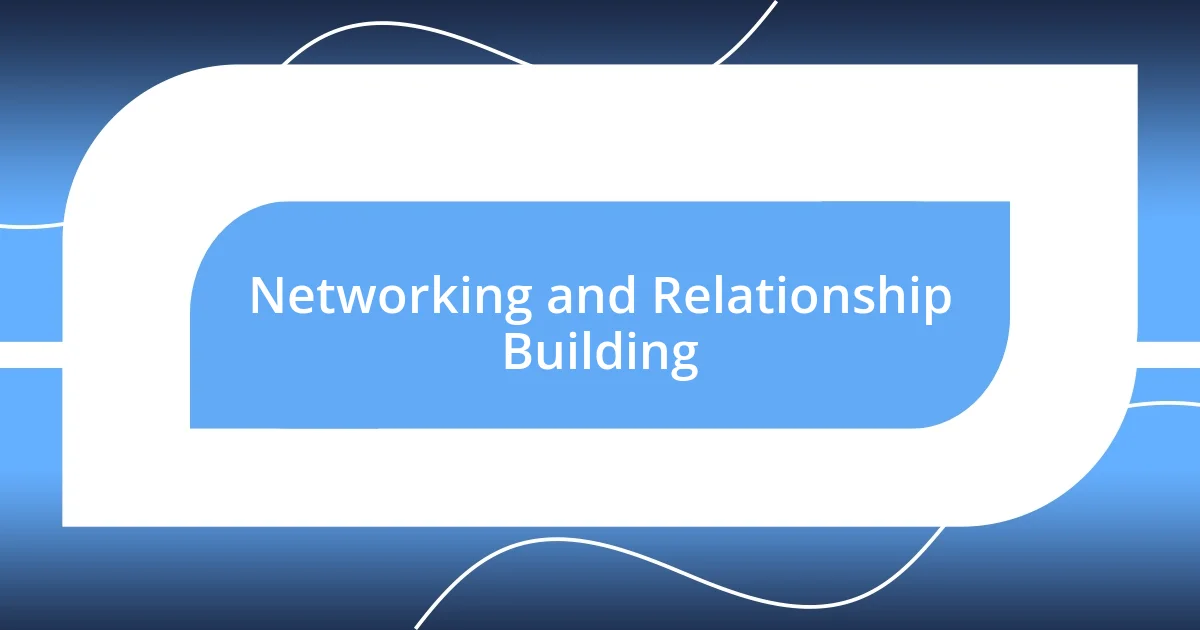
Networking and Relationship Building
Building a strong network in real estate has been instrumental for me. I still remember my first few networking events; I was nervous and unsure if I belonged there. But then I made an effort to genuinely connect with people, asking about their experiences and sharing my own. It was a game-changer when I discovered that most attendees were just as eager to connect as I was. Have you ever felt that initial hesitation to reach out to someone? I can assure you that breaking that barrier opens doors.
One particular moment that stands out was when I attended a local real estate expo. I engaged with a veteran agent who shared invaluable tips about navigating the market. We exchanged contact information and stayed in touch afterward, and that connection ultimately led to a lucrative partnership a few months later. It made me realize how essential it is to follow up and maintain those relationships—something as simple as a message can deepen those bonds. Do you often reach out to people after meeting them?
Another key insight I’ve learned is the power of nurturing these relationships over time. I regularly check in with my contacts, sending them industry updates, or just a friendly hello. One time, I sent a text to an acquaintance who had just started in real estate, offering to grab coffee and share insights. What I didn’t expect was how much that small gesture would mean to him; he later told me it motivated him to keep pushing through the challenges of the business. Isn’t it wonderful how a simple act of kindness can strengthen connections?




